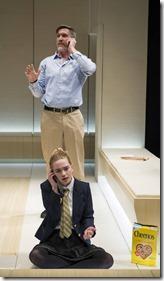
Sleek and smart, Stoppard creates a banquet of food for thought
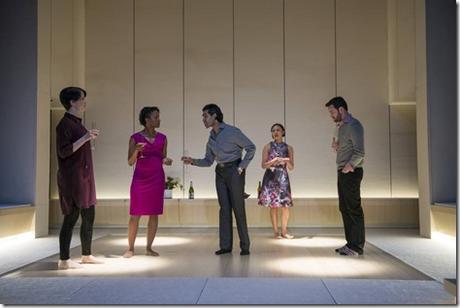
Review by Catey Sullivan
About halfway through Tom Stoppard's 2006 drama , there's a scene where a scholar dying of cancer and her husband have a lacerating argument about the definition of human consciousness. The husband insists that humans are little more than masterfully crafted machines, and that if we only had enough space and the technical know-how, we could build functioning human brains out of beer cans.
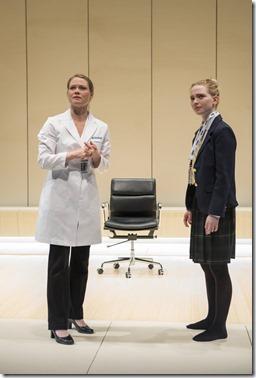
"I am not my body. My body is nothing without me," Eleanor retorts. It's a powerful argument that humans are something far more than the well-engineered sum of their infinitely elaborate parts.
With The Hard Problem , Stoppard revisits the mystery he broached in Rock 'n Roll. In Court Theatre's production, a new set of characters wrestle with what constitutes human consciousness - and what makes human consciousness different from that of apes - or plants, for that matter.
Twined near the heart of this endlessly knotty problem with our understanding of morality: Neuroscience professor Spike (Jürgen Hooper) says that humans only do the right thing because it benefits them - altruism is no more than the outcome of a cost/benefit analysis. Humans do good, he says, because they've learned that it profits them to do so. In Spike's world, "altruism goes back to biology" always, because it yields benefits both in terms of developing evolutionary advantages (blood-gorged bats sharing their bounty with hungry bats) and over the short-term of individual lives (humans offering a ride home to someone they want to have sex with).
Hilary (Chaon Cross) believes there's more to goodness than biology. For her, basic human goodness and decency come from something other than the sort of calculation you'd make while playing the stock market. You can measure pain, she notes of brain studies, but you cannot measure things like love or sorrow. "Morality is not science," she says, "So it must be something else."
That's the nub of the "hard problem" of Stoppard's title. Directed by Charles Newell, the 100-minute deep dive into the problem's complexities provides a banquet of food for thought. The Hard Problem isn't on a level with Stoppard's masterpiece epics and . More than a few times, the discussion in The Hard Problem devolves into the sort of unoriginal Deep Thoughts that undergrad psych majors have been hashing over for centuries.
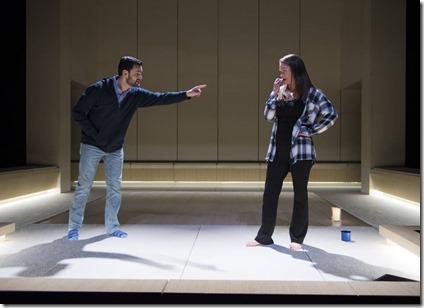
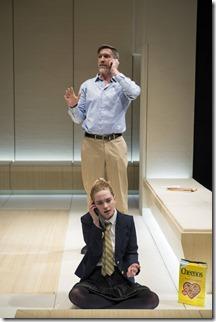
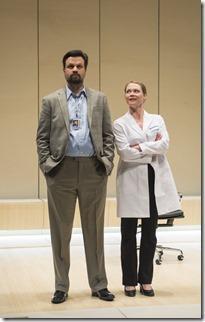
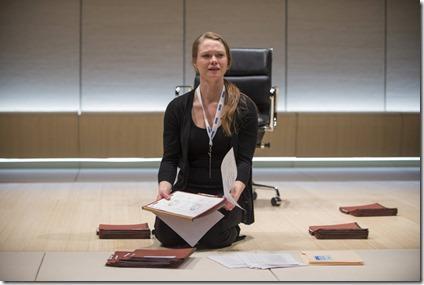
That said, The Hard Problem is sleek, smart and beguiling. Newell's sharp and luminous cast keeps you engaged both intellectually and emotionally, even when the dialogue is less than dazzling.
One of Stoppard's gifts is his ability to take the most intricate issues - the socio-political impact of Prague Spring, the lyrics of Syd Barrett, the philosophical underpinnings of Classical versus Romantic landscape architecture - and make them accessible without simplifying them. He uses this same technique regarding the nature of consciousness in The Hard Problem .
Stoppard is far too intelligent to offer answers. If you're looking for a definitive yes or no as to the existence of the divine spark, you won't find it here. Instead, Stoppard packs The Hard Problem with memorable characters and dialogue has the resonance of everyday drama rather than academic debate. The Hard Problem delves the stuff of neuroscience PhD dissertations, but it does so in a manner that's about as far from the dry, jargon-heavy language of academia as you can get.
The plot follows Hilary from psychology student to research scientist at a center funded by a hedge-fund manager. As Stoppard reveals with gradual grace, Hilary has a potent personal motive for believing in both the power of prayer and that goodness is more than biological imperative. Her professor/lover Spike accuses her of turning her mind into a "party balloon," but Hilary's stance is stalwart. "Morality is not science," she says, "So it must be something else."
The dicey morality of a global economic system that favors the incredibly wealthy hovers like a shadowy scrim around The Hard Problem . While the Krohl Institute scientists study human empathy, founder Jerry Krohl (Nathan Hosner) is engaged in the dubiously moral work of making billions for the upper one percent of the one percent.
Stoppard is more forthright with a last-act problem Hilary runs into regarding a ground-breaking, game-changing research paper she's published with her assistant Bo (Emjoy Gavino). Saying more would result in spoilers, but the impact of Bo's work puts Hilary on a path that's unexpected and liberating - and throws Bo's own moral compass into question.
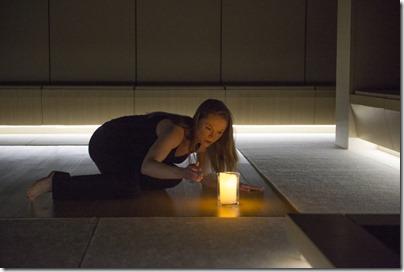
Stoppard's plot stumbles when he introduces an incredibly unlikely coincidence into the final scenes. Again, saying more wouldn't be fair. But the development is simply too farfetched to believe and altogether too tidy in wrapping up the loose ends in Hilary's life.
Still, Newell and his ensemble deliver a compelling and cerebrally stimulating piece of theater. As Hilary, Cross creates a character of fierce intellect and equally intense emotions. The scene transitions have Cross in a whirlwind of modern dance that adds a layer of urgency to the character and the questions driving her work. Hilary's past is defined by tragedy at a young age, and Cross embeds the character with a sorrow that gleams to the surface even in most comic moments.
Gavino's Bo is also memorable as a brilliant mathematician whose starry-eyed desire to please her boss is laced with sincere - but never sappy - adoration that will be instantly relatable to anyone who has ever been in love or infatuated.
Hooper's Spike is both smug and endearing, depending on what he's talking about and how much he's had to drink. Owais Ahmed is also marvelous as a short-tempered, slightly arrogant researcher who doesn't quite know enough to see his own shortcomings. As Jerry Krohl, Hosner exudes the godlike confidence of someone who can alter the world's economy with the flick of a finger. And as Jerry's teenage daughter Cathy, Sophie Thatcher perfectly captures both the vulnerability and the swagger of a teenager certain she knows better and more than most of the exasperating adults in her life.
John Culbert's minimalist scenic design has the clean, spare lines of a dance studio - an utterly fitting space for a group consumed by the dance-like electrical impulses of the brain.
If it can be said that brains feel happiness, Stoppard's latest drama creates that feeling - as well as a sense of wonder and awe at the unknowableness of it all.
The Hard Problem continues through April 9th at Court Theatre, 5535 S. Ellis (map), with performances Wednesdays & Thursdays at 7:30pm, Fridays 8pm, Saturdays 3pm & 8pm, Sundays 2:30pm & 7:30pm. Tickets are $48-$68, and are available by phone (773-753-4472) or online through their website (check for half-price tickets at Goldstar.com ). More information at CourtTheatre.org. (Running time: 100 minutes, no intermission)
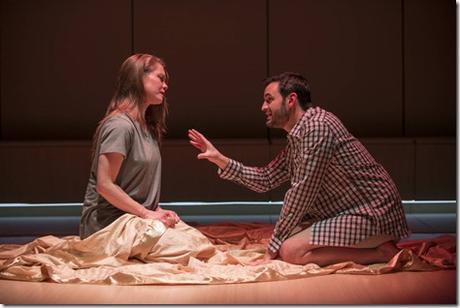
Photos by Michael Brosilow
behind the scenes
Charles Newell (director), John Culbert (scenic design), Nan Cibula-Jenkins (costume design), Keith Parham (lighting design), Andre Pluess (sound design), Eva Breneman (dialect design). Amanda Weener-Frederick (production stage manager), Nora Titone (production dramaturg), Michael Brosilow (photos)
Tags: 17-0330, Amanda Weener-Frederick, Andre Pluess, Brian McCaskill, Catey Sullivan, Celeste M. Cooper, Chaon Cross, Charles Newell, Chicago Theater, Court Theatre, Emjoy Gavino, Eva Breneman, John Culbert, Jürgen Hooper, Kate Fry, Keith Parham, Michael Brosilow, Nan Cibula-Jenkins, Nathan Hosner, Nora Titone, Owais Ahmed, post, Sophie Thatcher, Tom Stoppard
Category: 2017 Reviews, Catey Sullivan, Court Theatre, Tom Stoppard

